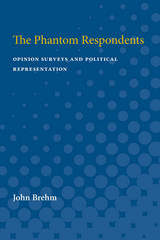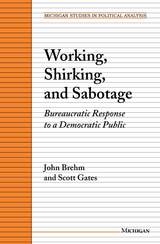2 books about Brehm, John O.

The Phantom Respondents
Opinion Surveys and Political Representation
John Brehm
University of Michigan Press, 1993
Polls and surveys pervade political and social life in ways that are both conspicuous and subtle. We gauge the success of presidential aspirants by how well they scored in polls broadcast on the nightly news. Our political leaders and candidates for every major office study the polls to identify the public's preferences on controversial policies. The Phantom Respondents develops the simple premise that public opinion surveys and polls have become a modern vehicle for political representation, and that as such, we must attend to the quality of representation that surveys and polls provide. For all the many and varied uses of surveys and polls, there is one weakness common to all: the steadily rising numbers of people who refuse to answer the interviewer's questionnaire. The irony is biting: at the very same time that we grow more dependent upon surveys and polls, the representativeness of the same polls and surveys is in jeopardy. Survey nonresponse undermines the fairness of surveys, amplifies inequalities in political representation, and imperils scientific research by misrepresenting general public opinion. This book will be of interest to anyone who uses data from survey research. While the specific focus of this book is aimed at the effect that survey nonresponse has upon understanding politics, scholars in such diverse fields as economics, sociology, and epidemiology could easily draw extensions to their primary concerns.
[more]

Working, Shirking, and Sabotage
Bureaucratic Response to a Democratic Public
John Brehm and Scott Gates
University of Michigan Press, 1999
Bureaucrats perform most of the tasks of government, profoundly influencing the daily lives of Americans. But who, or what, controls what bureaucrats do?
John Brehm and Scott Gates examine who influences whether federal, state, and local bureaucrats work, shirk, or sabotage policy. The authors combine deductive models and computer simulations of bureaucratic behavior with statistical analysis in order to assess the competing influences over how bureaucrats expend their efforts. Drawing upon surveys, observational studies, and administrative records of the performance of public employees in a variety of settings, Brehm and Gates demonstrate that the reasons bureaucrats work as hard as they do include the nature of the jobs they are recruited to perform and the influence of both their fellow employees and their clients in the public. In contrast to the conclusions of principal-agency models, the authors show that the reasons bureaucrats work so hard have little to do with the coercive capacities of supervisors.
This book is aimed at students of bureaucracy and organizations and will be of interest to researchers in political science, economics, public policy, and sociology.
"This book is breathtaking in its use of models and techniques. . . . The approach developed by Brehm and Gates allows us to re-open empirical questions that have lain dormant for years." --Bryan D. Jones, University of Washington
John Brehm is Associate Professor of Political Science, Duke University. Scott Gates is Associate Professor of Political Science, Michigan State University.
John Brehm and Scott Gates examine who influences whether federal, state, and local bureaucrats work, shirk, or sabotage policy. The authors combine deductive models and computer simulations of bureaucratic behavior with statistical analysis in order to assess the competing influences over how bureaucrats expend their efforts. Drawing upon surveys, observational studies, and administrative records of the performance of public employees in a variety of settings, Brehm and Gates demonstrate that the reasons bureaucrats work as hard as they do include the nature of the jobs they are recruited to perform and the influence of both their fellow employees and their clients in the public. In contrast to the conclusions of principal-agency models, the authors show that the reasons bureaucrats work so hard have little to do with the coercive capacities of supervisors.
This book is aimed at students of bureaucracy and organizations and will be of interest to researchers in political science, economics, public policy, and sociology.
"This book is breathtaking in its use of models and techniques. . . . The approach developed by Brehm and Gates allows us to re-open empirical questions that have lain dormant for years." --Bryan D. Jones, University of Washington
John Brehm is Associate Professor of Political Science, Duke University. Scott Gates is Associate Professor of Political Science, Michigan State University.
[more]
READERS
Browse our collection.
PUBLISHERS
See BiblioVault's publisher services.
STUDENT SERVICES
Files for college accessibility offices.
UChicago Accessibility Resources
home | accessibility | search | about | contact us
BiblioVault ® 2001 - 2024
The University of Chicago Press









